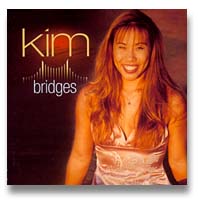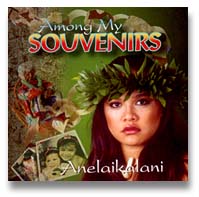

|
Island Mele John Berger |
"Call It What You Like ..."
Mark Keali'i Ho'omalu Mark Keali'i Ho'omalu is a leader and innovator in the "off-island Hawaiian music" scene on the mainland. The title of his second album reflects his response to those who attack his work for not being "authentic" enough.
MKH ProductionsChant is the foundation of Ho'omalu's work here. Western instruments add contemporary textures to three songs, but are never used as simple sonic filler. Ho'omalu includes the Hawaiian lyrics for all, basic English translations for some, and a brief explanation of his unique approach to chant and hula. The inclusion of such information makes this a valuable cultural reference as well as interesting listening for chant fans.
A final unlisted track in which Ho'omalu discusses various meanings of po, and his approach to his culture, is a great bonus.
www.mountainapplecompany.com
Mpeg Audio Clips:
Keali'i Milimili
Halepi'owai
Kawaiki
Quicktime | RealPlayer | MPEG-3 info
"Bridges"
Kim Karaoke contest veteran Kim Shimamoto won Kata Maduli's "Battle for the Bash" contest in 2001, and one of her prizes included a record deal. This five-song CD calling card is the result.
Discos TropicalMaduli didn't cut corners as the project's producer. Instead of using low-budget synth tracks, he brought in some of Honolulu's top studio players to help out. Justin Kawika Young wrote a song for the project and joins Shimamoto for a duet on one of two versions of "Sooner with Goodbye." Given Young's popularity, this could be her entry to local radio.
Session arrangers Maduli and Michael Grande came up with an interesting arrangement of "Bridge Over Troubled Water" that is the best demonstration of Shimamoto's vocal prowess, but her "Heat Wave" falls far short of Martha & The Vandells' powerful original -- just like Linda Ronstadt's remake back in 1975.
www.tropicalmusichawaii.com
Mpeg Audio Clips:
Dreaming Again
Bridge Over Troubled Water
Ooh Boy (Club Mix)
Quicktime | RealPlayer | MPEG-3 info
"Among My Souvenirs"
Anelaikalani Anelaikalani's second full-length album is yet another good news / bad news project from producer Kenneth Makuakane. The good news is that the long-awaited album is out, reaffirming her place as one of Hawaii's top teenage female Hawaiian falsetto singers. Her voice is sweet and rich, and she makes judicious use of ha'i (the technique of emphasizing the break between a singer's lower and upper vocal registers). She is also starting to explore hapa-haole music, a step away from her strictly Hawaiian repertoire.
Shaka
Makuakane and his all-star studio band give her great support as well. There are several gems here.
The bad news is that Makuakane, once again, has again failed to provide any information on what these songs are about, what makes them significant, or what inspired the songs he wrote for the album. Anelaikalani deserves better, and fans and students of Hawaiian music are entitled to have that information readily on hand.
Mpeg Audio Clips:
I Alii No Oe
Kauoha Mai
My Hawaiian Souvenir
Quicktime | RealPlayer | MPEG-3 info
See Record Reviews for some past reviews.
John Berger, who has covered the local
entertainment scene since 1972, writes reviews of recordings
produced by Hawaii artists. See the Star-Bulletin's Today
section on Fridays for the latest reviews. Contact John Berger at jberger@starbulletin.com.



